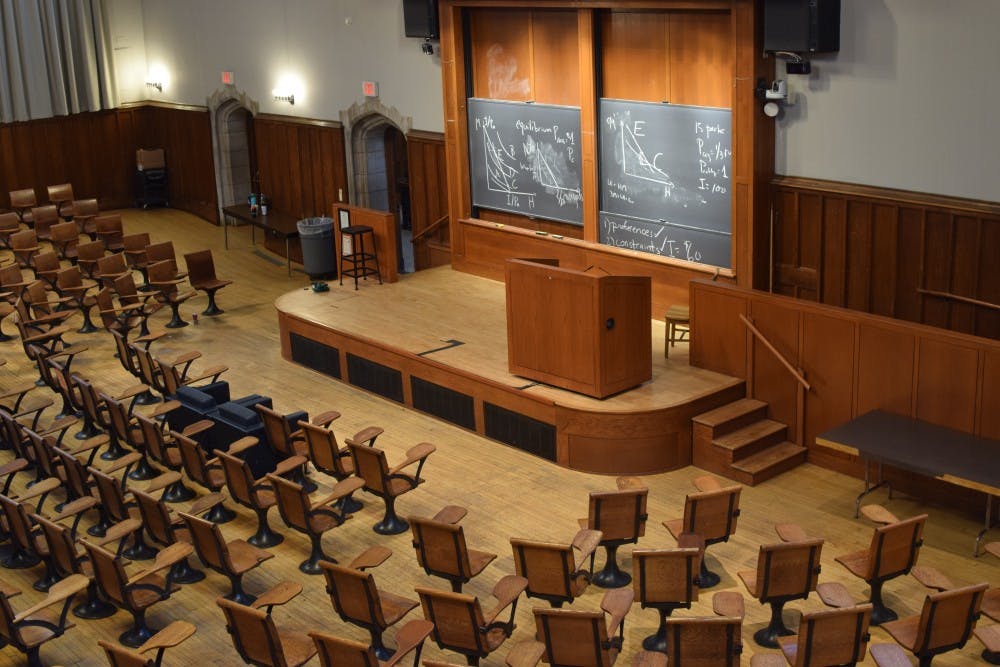To take advantage of opportunities for which this campus is especially noted, we are often encouraged to attend exclusive, high-profile, and high-brow events. The distinguished speakers likely attended the University, and they might have donated substantially. Regardless, take a look at your inbox for the past week; how many emails did you overlook or pay heed to, depending on your disposition, regarding the institutional ties held by impending guests, ties which we are taught relentlessly to covet and venerate?
Reflect, briefly, on what we tend to find convincing — what sorts of backgrounds motivate us to turn out in droves to soak in the transcendent wisdom of the modern village elder? It's all well and good to have a healthy respect for life experience. But which people we choose to listen to most reveals features of the ideological and cultural structures to which we pledge allegiance in our actions, more so than in our words.
This is not because we are blameworthy as individuals; there are other reasons that a certain deference to a particular elite represents the default setting of our population at large. But a failure to acknowledge the considerations that come to the fore in our prioritization of voices on campus is nothing more than a reflexive defense of antiquated delusions regarding the definite ideological content of our social and intellectual surroundings.
When we set aside time in our day to attend an event with a particular speaker, we must consider the selection and approval by a segment of the campus community of this person. Broadly speaking, it seems safe to assume that this individual has made statements and commitments that evoke positive responses, at least somewhere. This, by the way, represents the basis for arguments favoring ideological diversity: that, absent a broad and representative distribution of political perspectives, our exposure to deviant, but potentially insightful, ideas will be curtailed.
If this line of reasoning represents a genuine dedication to self-improvement, via an occasional exodus from one’s conceptual comfort zone, then it will take much more than vibrant disagreements about isolated issues; instead, voices must be elevated and heard that do not conform to the conventions expected by the middle-of-the-road orthodoxy of mainstream, respectable discourse.
What is it that allows us to take a particular speaker seriously enough to slice those precious hours out of our days, which we constantly protest are packed to a point past bursting asunder? Generally speaking, in other words, why even bother? The mainstream reaction, of course, is that we should make maximum use of our cosmopolitan environment, that we should make ourselves noticeable and impressive in the eyes of the particular movers and shakers in whose shoes we might aspire to eventually step. Such rhetoric is characteristic of a very particular regime of titular esteem. That is to say, we elevate credentials and affiliations over the specific accomplishments that supposedly distinguish the individual under consideration.
But it tends to be the case that these people are where they are precisely because they do not play distinctive or revolutionary roles; rather, they have had the good, self-preserving sense to refrain from rocking the boat too aggressively. This is not a categorical case against stability, but with the understanding that institutions have assumptions that gain momentum over time, those who serve as their heralds and figureheads must be identified with those assumptions. The values that flow from these structures, despite what their advocates might profess, are no more factual than those voiced by their opponents.
Occasionally, speakers are chosen for deviating from the default narrative. Furthermore, there are generally no efforts to explicitly prevent their participation in campus discourse. While they may be even more deserving of praise than their competent, but conformist, counterparts in the political and social middle, they are not afforded the same type of audience; their speech is not taken quite so seriously. They do not emulate the behaviors of an elite in-group, and they are therefore denied full entry not by formal edict, but through the instrumentality of a false, unbiased impartiality that relegates their input to the discursive sidelines. This is not to say that people should attend everything or nothing, or that we should judge one another on the basis of where we spend our time. Yet the association of dissident voices with ideology, as though strident political conviction, as opposed to the innocently tedious speeches of mainstream voices, is equivalent to membership in a cult whose every ritual is beyond the pale, ignores the very tangible ideological presuppositions taken for granted, if not stated outright, on center stage.
Those who occupy the center can afford to remain calm, to articulate themselves with the poise that we've come to expect of professionals who have long ago mastered their fields. As such, we associate urgency and dissent with bias and stridency; the center is invariably depicted as the reasonable, that which is without arbitrary prejudices or baseless presumptions or unfounded starting points. This allows us, as a general rule, to be more impressed with those who, for instance, fight their way from the middle to the top than by those who struggle from sinking even more, having started clinging to the first rung of a social ladder, the existence of which it is inconvenient even to contemplate. But we are here, hopefully, to get something out of our experience that goes beyond the expediency of the comforting outlook of the default culture.








